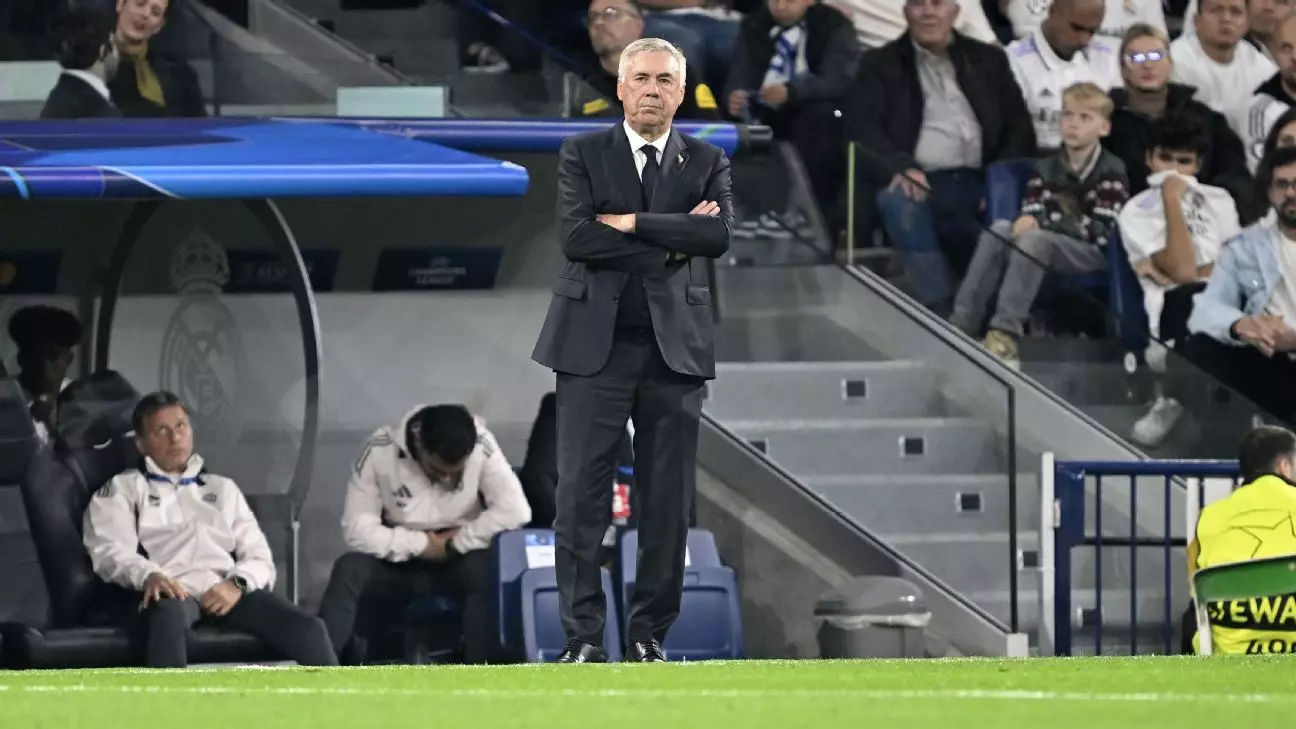Real Madrid’s recent performance has raised serious concerns about the team’s trajectory this season. Following a disappointing 3-1 defeat at home to AC Milan in the Champions League, manager Carlo Ancelotti openly expressed his worries, emphasizing the need for immediate improvements. This loss came on the heels of an equally distressing 4-0 drubbing by Barcelona in the latest edition of El Clásico, leaving fans and analysts alike questioning the club’s current state.
The match against AC Milan unveiled significant weaknesses in Real Madrid’s defense. Malick Thiaw’s header opened the scoring for Milan, showcasing Madrid’s vulnerability from set pieces—a problem that has plagued them throughout the early fixtures of the season. Despite Vinícius Júnior leveling the score with a penalty, Madrid was unable to maintain momentum, conceding two more goals before the halftime whistle. Álvaro Morata’s strike before the interval, coupled with Tijani Reijnders sealing the game with a third goal late on, illustrated a concerning trend: Madrid is leaking goals at an alarming rate. Ancelotti’s admission that the team has conceded nine goals in three Champions League matches is particularly alarming for a club that prides itself on defensive solidity.
Critics might suggest that the root of Madrid’s problems lies in their midfield dynamics, particularly given the high-profile signing of Kylian Mbappé to complement Vinícius Júnior. While Ancelotti highlighted the attack as not being the core issue, stating that the squad squandered numerous chances, the midfield’s inability to control the game has been stark. A solid midfield is essential for both defensive stability and offensive creativity, and it appears Madrid lacks a cohesive unit capable of executing this balance effectively. It has become evident that while they can generate opportunities, there is a lack of decisiveness and clinical finishing that can change the game in their favor.
Psychological Barriers and Team Morale
Ancelotti’s discourse did not shy away from the psychological aspects of the game; he noted, “Worry in these moments is normal.” This frank admission suggests that beyond technical issues, the players may be struggling with confidence following a series of disappointing results. The notion of a “healthy dressing room” was stressed, yet one cannot ignore that morale can quickly sour in the face of continued adversity. This is particularly true for a club with Madrid’s immense expectations, where simply competing is not enough—winning is mandatory. Ancelotti has hinted that addressing these psychological barriers and instilling a fighting spirit will be crucial as the season progresses.
As Real Madrid prepares for their next La Liga match against Osasuna, Ancelotti’s strategic revisions will be essential in steering the ship back on course. The international break following this fixture may provide a critical moment for reflection and recalibration within the squad. Understanding their situation in the context of La Liga and Champions League standings—where they trail leaders, Barcelona, by nine points—demands urgent action.
Moving forward, the challenge lies in solidifying the defense while fostering a more cohesive midfield. The upcoming fixtures will serve as a litmus test for this iteration of Madrid. Facing formidable opponents such as Liverpool in their next Champions League match will further expose their vulnerabilities and demand a clinical response.
The underlying issues plaguing Real Madrid are multifaceted. It is essential for the management and players to not only address tactical deficiencies but also focus on building a resilient mindset. Football is a relentless journey filled with highs and lows; how Madrid responds to this adversity will be pivotal in determining whether they can still achieve success this season.

